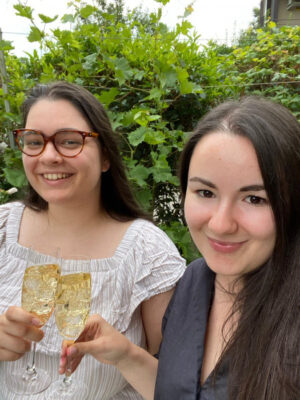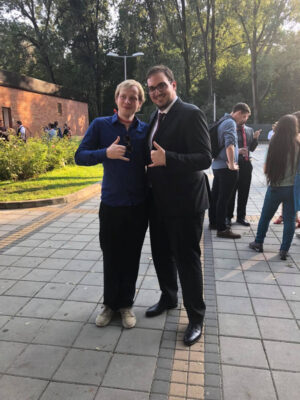Madrid EUDC 2021 – DK Wien und BDU sind ESL-Vizemeister
Die Madrid EUDC 2021 ist vorüber. Nach neun Vorrunden und den Ausscheidungsrunden kommen die neuen Europameister aus Oxford und Ljubljana.
ESL

Vienna A: Marina Kojić (l.) und Miri Muntean (r.) – © Privat
Bei der European University Debating Championship 2021 in Madrid haben es zwei Teams aus dem VDCH Land in das Finale der ESL-Kategorie (English as Second Language) geschafft! Vienna A (Miri Muntean, Marina Kojić) in der Eröffnenden Opposition und BDU C (Calyxx Peucker, Josef Moscovici) in der Schließenden Opposition trafen dort auf die Eröffnende Regierung Ljubljana HK (Rok Hafner, Filip Korošec) und die Schließende Opposition TAU A (Gil Peled, Assaph Hanany; Tel Aviv). In der Debatte zu dem Thema „THP humans to aquire memories* of their past lived experiences upon reaching adulthood rather than staying oblivious * memories of past lived experiences include events, interactions and emotions, but not skills“ konnte sich am Ende die Eröffnende Regierung aus Ljubljana durchsetzen. Die Debatte wurde von Klaudia Maciejewska (Hauptjurorin), Emma Lucas, Jessica Musulin, Joseph Lewis, Luigi Alca~neses, Miriam Kalman und Neo Wei Shang juriert.
Die Aufzeichnung des Finals kann hier angeschaut werden.
Während BDU C auf Platz 8 in der ESL-Wertung breakte, erreichte Vienna A nicht nur Platz 3 in der ESL-Kategorie, sondern gleichzeitig mit Platz 10 in der Gesamtwertung auch den Open Break!
ESL-RednerInnen Top 10:
1. Tamar Ben Meir (HUJI B) – 80,56 P.
2. Kuberan Hansrajh Kumaresan (Oxford A) – 80,44 P.
3. Gil Peled (TAU A) – 80,33 P.
4. Assaph Hanany (TAU A) 80,22 P.
4. Chris Mentis Cravaris (Imperial A) 80,22 P.
6. Olja Bosnjak (Zagreb A) 79,78 P.
7. Lior Sokol (HUJI B) 79,56 P.
7. Rok Hafner (Ljubljana HK) 79,56 P.
9. Daan Spackler (Trivium A) – 79,22 P.
9. Josef Moscovici (BDU C) – 79,22 P.
Open
Im Grand Final der Europameisterschaft setzte sich die Schließende Regierung Oxford B (Rachel O’Nunain, Oskar Sherry) gegen die Eröffnende Regierung LSE A (Taha Iqbal, Ana Vilhelmina Verdnik), die Eröffnende Opposition HUJI B (Lior Sokol, Tamar Ben Meir; Jerusalem) und die Schließende Opposition TCD Hist A (Caoimhin Hamill, Jack Synnott; Dublin) durch. Die Debatte zum Thema „This house supports a Multi-Speed Europe“ wurde von Matt Hazell (Hauptjuror), Amrit Agastia, Ilija Ivanišević, Robert Barrie, Ron Leizrowice, Uphie Abdurrahman und Yarn Shih juriert.
Die Aufzeichnung des Grand Finals ist hier zu finden.
Open RednerInnen Top 10:
1. Jack Synnott (TCD Hist A) – 83,11 P.
2. Caoimhin Hamill (TCD Hist A) – 82,56 P.
3. Ana Vilhelmina Verdnik (LSE A) – 81,44 P.
3. Rachel O’Nunain (Oxford B) – 81,44 P.
5. Taha Iqbal (LSE A) 81,33 P.
6. Oskar Sherry (Oxford B) 80,89 P.
6. Josh Kemp (LSE B) – 80,89 P.
8. Jason Woods (Edinburgh A) 80,67 P.
9. Tamar Ben Meir (HUJI B) – 60,56 P.
10. Kuberan Hansrajh Kumaresan (Oxford A) 80,44 P.
10. Andew Chen (Oxford A) – 80,44 P.
Der VDCH auf den Euros

BDU C: Calyxx Peucker (l.) und Josef Moscovici (r.) – © Privat
Vermutlich aufgrund der geringen zeitlichen Distanz zu der erst kürzlich nachgeholten World University Debating Championship (WUDC) nahmen dieses Jahr insgesamt deutlich weniger Teams an der Europameisterschaft teil, als in vorigen Jahren. Aus dem deutschsprachigen VDCH Raum nahmen mit dem Debattierklub Wien, der Berlin Debating Union und einem Mixed-Team aus Bonn und Würzburg sieben Teams teil. Neben den breakenden Teams vertraten außerdem Vienna B (Paula Breyer, Mira Eberdorfer), Vienna C (Liam Urban, Victor Bervoets), BDU HNH (Emma Hansen, Anna-Catharina Nunes-Heinzmann), Berlin LS (Braedon Lehman, Marc-Andre Schulz) sowie JMU Würzburg (Daniel Koch, Charles Chitundu) den VDCH.
Als JurorInnen nahmen außerdem Helena Hecke (Tilbury House Köln) und Uzair Tajuddin (Debattierclub München) und Sven Bake (Debattierclub Würzburg) teil. Helena und Uzair erreichten dabei den JurorInnen-Break.
Die Themen:
R1: THW prioritise means-based[1] rather than target-based[2] regulation
[1] e.g of means-based regulations: setting standards that attempt to make the workplace more accessible or banning the use of polluting technologies
[2] e.g of target-based regulations: setting hiring quotas for employees from one particular group, or making companies reduce carbon emissions to X under threat of fines
R2: TH, as a University scholarship fund targeted at marginalized identity groups, W prioritize allocating funds based on merit rather than economic necessity.
R3: THO the narrative that love (romantic, familial, etc.) is about sacrifice
R4: THBT societal narratives about recovery during crisis should be transformative (attempt to radically change society) rather than restorative (attempt to stabilise current crisis)
R5: Infoslide: In Spain there are two ways financial autonomy is exercised by autonomous regions:
In the common regime the central government is in charge of setting and collecting most taxes, which it then redistributes between all the autonomous regions with the aim of reducing inequalities between regions. This implies that richer regions become net contributors to the system, while poorer ones become net recipients. Catalonia is currently under a common regime.
The second regime is a chartered regime, where as long as regions pay a fixed amount to the central government, they are allowed full control over setting and collecting non-VAT taxes (including raising or lowering tax). Currently only Basque Country and Navarre have a chartered regime.
TH, as the Spanish government, would give Catalonia a chartered regime
R6: Infoslide: For the purposes of this debate, „social marxism“ is defined as the belief that members of all oppressed groups should unite and fight together. Social marxism states that you cannot support one group without also supporting all others.
THBT social movements should follow social marxism
R7: Infoslide: Nord Stream 2 is a set of offshore natural gas pipelines directly linking Russia and Germany. It would double the amount of natural gas that Germany directly imports from Russia.
THR Germany’s decision to go ahead with the Nord Stream 2 deal with Russia
R8: THBT states should prioritise high employment rates at the expense of significantly slowing down technological advancement (e.g. taxing automation, setting a minimum quota for human employees, or banning/limiting use of certain technologies)
R9: In functioning democracies with one dominant political party, THP opposition parties to predominantly campaign on the basis of moral character (e.g. integrity, transparency, corruption) rather than predominantly on specific issues and policies (e.g. unemployment, education, the environment).
QF: Infoslide: Green Central Banking refers to central banks deliberately using their monetary policy instruments to incentivise climate-friendly market activities. For instance, targeted green lending programmes, targeted green bond purchase programmes, „“brown penalties““ (higher interest rates for pollution-intensive banks or businesses), lowering the financing rate for banks that offer collateral with a smaller carbon footprint, and mandatory disclosures of climate risks.
For the purposes of this debate, green central banking would support climate-friendly policies even at the expense of traditional monetary objectives such as targeting inflation rates, ensuring financial stability and market efficiency, as well as retaining neutrality of intervention.
THS Green Central Banking
SF: THP religious organisations to actively propagate the idea that faith in a higher power cannot be explained with logic, rather than attempt to explain faith rationally
F: Infoslide: Multi-Speed Europe is a scenario where existing Member States in the European Union integrate at different paces, where certain Member States opt in doing more in specific policy areas, while others opt out. This would not apply retroactively, so existing policies would remain unified, but new policies would be differentially adopted. These may cover policies such as defence, internal security, taxation or social matters.
THS a Multi-Speed Europe
ESL-SF: THBT the Myanmar opposition movement should prioritise demands for an immediate, internationally-observed election over demands for Aung San Suu Kyi to be freed
ESL-F: Infoslide: For the purposes of this debate reincaraction is real. It happens in human form only, in a random (not karmic) way, and doesn’t have to follow immediately after death.
This is known to all and considered an undisputable fact.
Humans have inherent traits that consist of their core personality and preferences. These get transferred through reincarnations and do not change. People are a combination of their inherent traits and their environment.
THP humans to aquire memories* of their past lived experiences upon reaching adulthood rather than staying oblivious * memories of past lived experiences include events, interactions and emotions, but not skills
jm.





